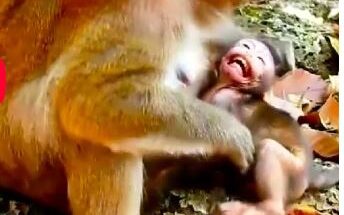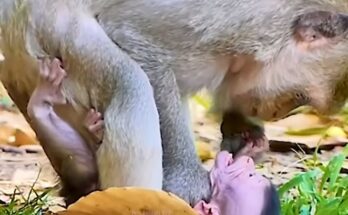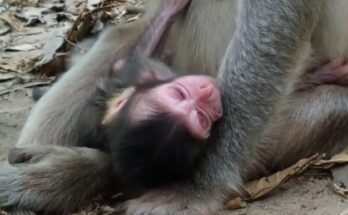In the dense forests where survival is a constant battle, one tiny monkey faces not just the harsh realities of nature, but an even more painful challenge—relentless bullying from an aggressive adult member of its troop. This young monkey, still learning how to navigate the world, has become a target for aggression, leaving it fearful, isolated, and struggling to find a safe space to simply exist.
Within primate social structures, hierarchy and dominance play vital roles. Older and stronger individuals often assert control, and while this can maintain order in the troop, it sometimes comes at a cost to the most vulnerable. In this case, the small monkey, possibly an orphan or simply lower in social rank, has become the scapegoat for a particularly dominant and aggressive adult. Each day brings new threats—chasing, biting, and shoving—that leave the youngster trembling and stressed.
Bullying in monkey troops isn’t always straightforward. Sometimes it stems from competition over food or space, but often, it’s a complex mix of social tension and displaced aggression. An adult who has recently lost status or feels threatened may redirect frustration toward weaker individuals. The tiny monkey, lacking allies or a strong mother figure to defend it, becomes the easiest target.
The emotional toll on the young monkey is profound. Constant stress can impair growth, weaken the immune system, and affect behavioral development. It becomes skittish, avoiding play with peers and staying at the edges of the group—where it’s more exposed to predators. The safe, curious world that young monkeys should enjoy becomes a landscape of fear.
Despite this adversity, the young monkey shows remarkable resilience. It learns to move quietly and quickly, always alert to signs of danger. Sometimes, a sympathetic adult—perhaps an older sibling or a low-ranking female—offers brief comfort: a grooming session, a shared patch of shade. These moments of kindness are rare but vital, giving the youngster a glimmer of security and connection in an otherwise hostile environment.
Researchers observing such behavior note that these early experiences can shape a monkey’s personality for life. Some grow up cautious and wary, others learn to mimic the aggression they endured, continuing the cycle. But in some cases, monkeys who overcome early trauma become especially empathetic or socially adept, able to read group dynamics with sensitivity that others don’t possess.
The small monkey’s story is a powerful reminder of the emotional complexity of primates. Just like human children, they suffer when bullied, and thrive when nurtured. Though the jungle is a wild and unforgiving place, moments of hope still exist—through resilience, unexpected friendships, and the quiet determination to survive another day.
In the end, the little monkey’s struggle is not just about enduring aggression—it’s about the search for safety, belonging, and peace in a world that often offers none. And in that search, even the smallest glimmer of kindness can make all the difference.


